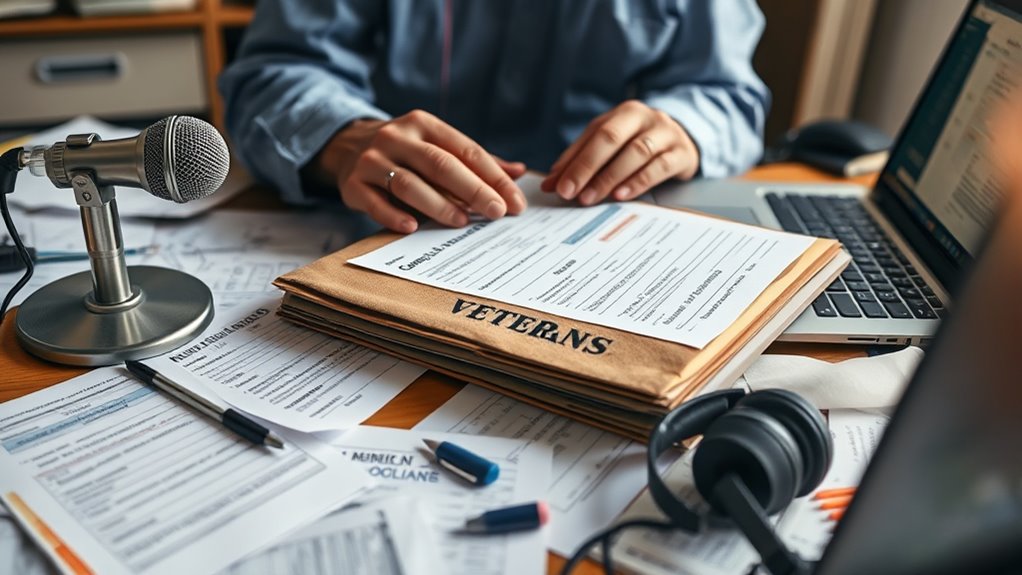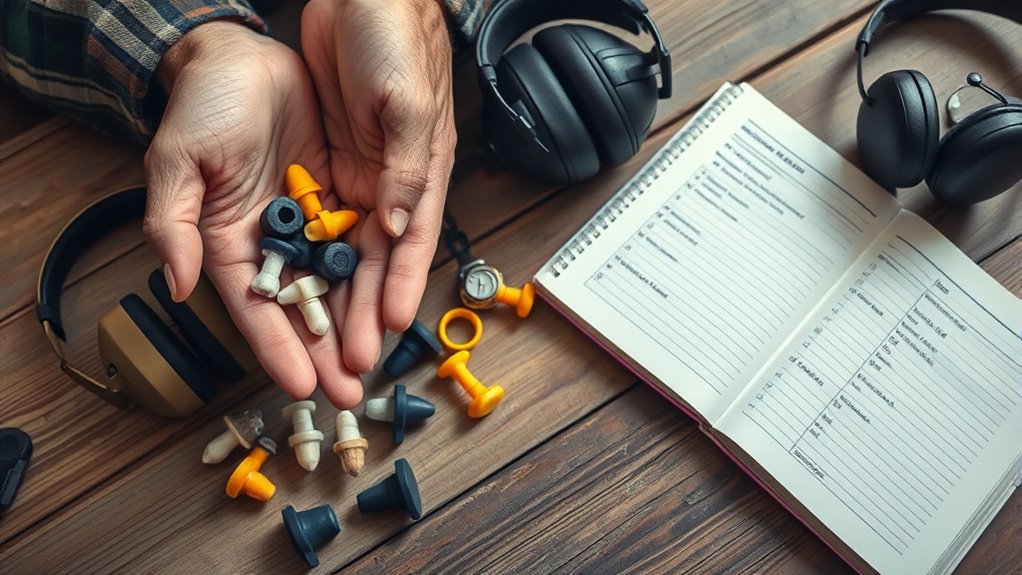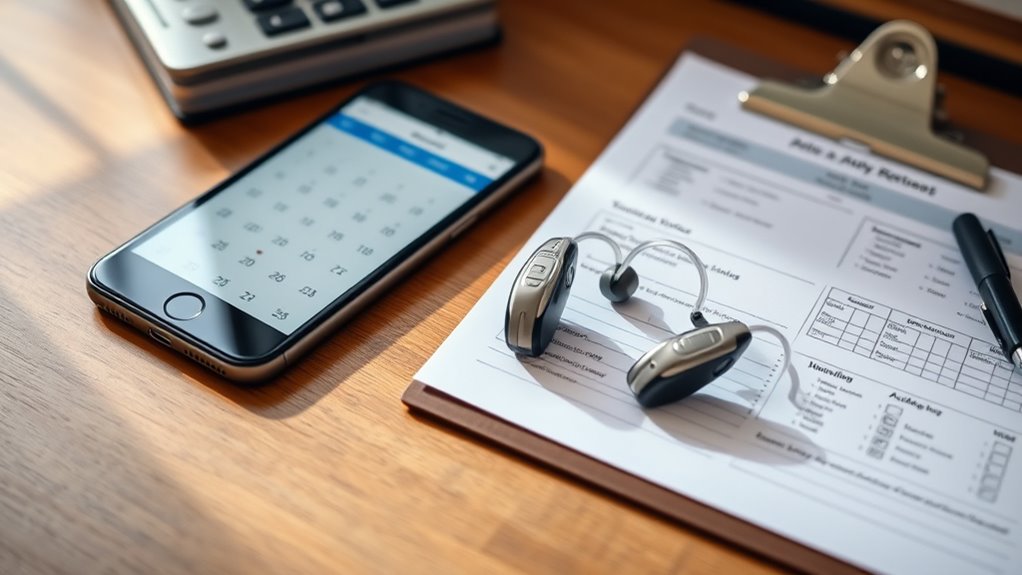To gather evidence for your hearing-related VA claim, start by reviewing your service and medical history for any documented noise exposure or ear injuries. Obtain all relevant medical records, audiograms, and treatment reports, organizing them chronologically. Collect witness statements from family or colleagues who notice your hearing issues and track your daily symptoms and their impact. Document any noise exposure and treatments received. If you continue, you’ll discover more detailed steps to strengthen your claim effectively.
Key Takeaways
- Collect service records documenting noise exposure, injuries, or ear-related diagnoses to establish connection to military service.
- Obtain and organize medical records, audiograms, treatment notes, and specialist reports that detail hearing issues.
- Keep detailed logs of hearing symptoms, environmental noise levels, and situations that worsen or improve your hearing.
- Obtain witness statements from family, friends, or colleagues describing how hearing loss affects daily life.
- Seek guidance from VA-accredited representatives or Veterans Service Organizations to ensure comprehensive evidence gathering.
Review Your Service and Medical History

Before gathering evidence for your hearing-related VA claim, it’s essential to review your service and medical history thoroughly. This helps establish a clear service connection, linking your hearing issues directly to your time in service. Look for records or documentation that mention hearing problems, noise exposure, or related injuries during your military career. Understanding your medical history allows you to identify any past diagnoses, treatments, or evaluations related to hearing loss. By familiarizing yourself with these details, you can better highlight relevant experiences and evidence when submitting your claim. A comprehensive review of your service and medical history provides a strong foundation, making it easier to demonstrate how your hearing issues originated and persisted from your service period. Additionally, paying attention to inspirational quotes about fatherhood can serve as a motivational reminder of the importance of perseverance and support during your claim process.
Obtain and Organize Medical Records and Reports

To strengthen your claim, start by gathering all relevant medical documentation, including test results and treatment records. Request specialist reports that can provide detailed insights into your hearing issues. Keep your files organized chronologically so you can easily access and present the evidence when needed. Consider reviewing best medical practices for documenting hearing problems effectively.
Gather Medical Documentation
Gathering your medical documentation is a crucial step in building a strong hearing-related VA claim. You need to collect all relevant records that show your hearing issues and treatment history. Imagine:
- Visiting your doctor to request detailed reports on your hearing tests and treatments.
- Locating prescriptions for hearing aids or ear protection devices you’ve used.
- Collecting audiograms, medical bills, and progress notes from specialists.
- Organizing these documents chronologically for easy reference during your claim process.
- Ensuring your records include medical reports that detail the severity and impact of your hearing condition.
Having your medical records ready helps establish your hearing condition’s severity and connection to service. Be sure to include notes on how hearing aids or ear protection impacted your daily life, strengthening your evidence for VA review. Proper documentation is your foundation for a successful claim.
Request Specialist Reports
After collecting your general medical records, it’s important to obtain specialist reports that provide detailed assessments of your hearing issues. These specialist reports include expert evaluations from audiologists or ENT doctors, which can markedly strengthen your claim. Contact your healthcare providers and request copies of their reports that specifically address your hearing concerns. Be clear about the purpose—to support your VA claim—and ask for detailed, thorough documentation. If necessary, follow up to ensure the reports include test results, diagnoses, and treatment notes relevant to your hearing condition. Organizing these specialist reports alongside your general medical records creates a complete picture of your hearing health, making it easier for VA reviewers to understand your condition’s severity and connection to your service. Incorporating AI-driven data analytics can also help you identify relevant information and ensure your documentation is comprehensive.
Organize Chronological Files
Organizing your medical records and reports in chronological order helps create a clear and all-encompassing timeline of your hearing issues. This is essential for effective document management and demonstrating the progression of your condition. To do this, imagine laying out your records like a detailed map, highlighting key moments.
You are trained on data up to October 2023.
Additionally, maintaining a detailed record of your medical visits can help you identify patterns and automate documentation, making it easier to present a comprehensive case.
Gather Documentation of Hearing Tests and Audiograms

To effectively support your hearing-related VA claim, you need to collect and preserve all documentation of your hearing tests and audiograms. These records provide essential evidence of your hearing loss and its severity. Be sure to keep copies of audiogram interpretations, which explain your hearing levels at different frequencies. Also, gather hearing aid records, including purchase receipts and maintenance logs, to show ongoing treatment. Organize your documents in a table like this:
| Document Type | Details |
|---|---|
| Audiogram interpretation | Date, results, examiner’s notes |
| Hearing aid records | Purchase date, adjustments, repairs |
| Hearing tests | Test date, audiologist report |
| Medical reports | Related ENT visits |
| Prescriptions | Hearing aid prescriptions |
Proper documentation strengthens your claim and makes it easier to prove your hearing issues. Additionally, keeping detailed records of your audiology appointments can help establish a comprehensive history of your hearing health.
Collect Statements From Family, Friends, and Colleagues

Gathering statements from family, friends, and colleagues can provide valuable firsthand accounts of how your hearing loss affects your daily life. These testimonial statements serve as witness accounts that support your claim by illustrating real-world challenges. To strengthen your case, ask your loved ones to describe specific situations where your hearing loss caused difficulties. Imagine them recounting:
Gather family and friends’ accounts of how hearing loss impacts daily life to strengthen your VA claim.
- Struggling to follow conversations in noisy environments
- Missing important sounds like alarms or doorbells
- Increasing misunderstandings during phone calls
- Avoiding social gatherings due to hearing issues
Additionally, highlighting any efforts you’ve made to improve your hearing, such as hearing aid usage, can further demonstrate the impact of your condition. These detailed accounts can help demonstrate the severity of your hearing loss and its impact, making your evidence more compelling for VA review. Witness accounts from trusted sources can profoundly bolster your claim.
Compile Evidence of Occupational and Environmental Noise Exposure

Supporting your hearing loss claim requires more than personal accounts; it also involves providing evidence of your exposure to loud environments. To do this, gather records or details showing your exposure to noise, especially from occupational hazards. If you worked in industries like construction, manufacturing, or mining, collect employment records, pay stubs, or job descriptions that highlight the noisy conditions. Talk to former coworkers or supervisors who can verify your noise exposure. Keep a detailed log of your work history, noting dates and durations of exposure to loud environments. This evidence helps establish a link between your occupational hazards and hearing loss. Remember, documenting your noise exposure is vital for substantiating your claim and demonstrating the connection to your hearing issues. Additionally, understanding the Mental Wellbeing Index can provide insights into how stress and emotional health may impact your overall recovery and advocacy process.
Document Any Treatment or Therapy for Hearing Issues

Have you documented all treatments or therapies you’ve received for your hearing issues? Keeping detailed records can strengthen your VA claim. Think about:
- Visiting an audiologist for hearing aids fitting or adjustments.
- Attending therapy sessions focused on auditory processing or communication strategies.
- Receiving speech therapy to improve hearing-related speech understanding.
- Undergoing medical procedures or treatments for ear injuries or infections.
- Recognizing the importance of medical documentation to verify the treatments you’ve undergone.
Be sure to save receipts, appointment summaries, and notes from your providers. If you’ve used hearing aids, document when you received them and any follow-up visits. For therapy sessions, note dates, duration, and the specific treatments. These records help establish the severity and ongoing nature of your hearing issues.
Keep a Personal Log of Symptoms and Impacts on Daily Life

Keeping a personal log helps you track your hearing symptoms and how they affect your daily routine. Use simple techniques like jotting down times, situations, and your reactions to different environments. This detailed record can provide essential evidence when supporting your VA claim.
Symptom Tracking Techniques
Tracking your symptoms and how they affect your daily life is essential for building a strong VA claim. Using digital apps or symptom diaries allows you to record details consistently and accurately. This helps capture patterns and severity over time.
Consider these techniques:
- Use a dedicated symptom diary or a smartphone app to log daily experiences.
- Note times of day when symptoms worsen or improve.
- Record specific activities that trigger or alleviate symptoms.
- Include details about how symptoms impact your work, sleep, and social interactions.
These records provide concrete evidence for your claim, making it easier to demonstrate the extent of your hearing impairment. Regular tracking ensures your documentation is thorough, organized, and ready when needed.
Daily Impact Documentation
Recording how your hearing issues affect your daily activities offers valuable evidence for your VA claim. Keep a detailed personal log of symptoms, noting times when your hearing challenges disrupt conversations, work, or leisure. Include how these difficulties impact your mental health, such as feelings of frustration, anxiety, or isolation. Document any changes in your social support, like avoiding gatherings or relying more on others for communication. This record highlights the real-life toll of your hearing issues, strengthening your case. Be consistent and specific—note patterns, triggers, and emotional effects. Incorporating observations about wall organization and the impact of clutter can also help illustrate how your environment affects your well-being. A thorough daily impact log provides clear, firsthand evidence of how your condition influences your overall well-being and daily functioning, making it a vital part of your VA claim documentation.
Seek Support From Veterans Service Organizations and Advocates

Seeking support from Veterans Service Organizations (VSOs) and advocates can considerably strengthen your VA hearing-related claim. These veterans organizations and advocacy groups have experience maneuvering the VA system and can provide valuable guidance. They can help you gather evidence, prepare documentation, and ensure your claim is thorough. Imagine:
- Meeting with a knowledgeable advocate who reviews your hearing loss history.
- Accessing resources from veterans organizations to strengthen your case.
- Receiving assistance in gathering medical records and supporting documents.
- Having advocacy groups represent you during VA hearings or appeals.
Their expertise can make a significant difference, helping you present a stronger, clearer case. Don’t hesitate to leverage these organizations—they’re dedicated to supporting veterans like you.
Frequently Asked Questions
How Long Should I Keep My Hearing-Related Documents?
You should keep your hearing-related documents indefinitely to guarantee proper record preservation and document retention. It’s crucial to maintain all medical records, test results, and correspondence related to your hearing issues. This way, you can easily access proof if needed for your VA claim or future medical care. Regularly organize and store these documents in a safe place, and consider creating digital copies for added security and ease of access.
Can I Submit Digital or Online Evidence?
Submitting evidence is like sending a digital postcard—quick and easy. You can definitely submit digital documentation for your hearing-related VA claim through online submission portals. Make sure your files are clear, legible, and in accepted formats like PDF or JPEG. This way, your evidence reaches the VA faster, helping your claim move forward smoothly. Always keep copies of your digital evidence for your records.
What if I Lost Some of My Records?
If you’ve lost some records, don’t worry. Focus on record preservation by trying to retrieve any remaining documents through document retrieval services or contacting the original sources. You can also submit alternative evidence like statements from witnesses or medical providers. Explain your situation clearly in your claim, and VA may help you locate or accept other forms of evidence to support your hearing-related claim.
How Do I Prove Hearing Loss From Occupational Exposure?
To prove hearing loss from occupational noise, you need solid evidence like audiology testing results that show your hearing decline over time. Document your work history in noisy environments and gather any medical records related to hearing issues. Statements from coworkers or supervisors can support your case. Combining audiology testing with these records helps establish a clear link between your occupational noise exposure and hearing loss.
Who Can Help Me Interpret My Audiogram Results?
Interpreting your audiogram might feel like decoding ancient hieroglyphs, but don’t worry—you’re not alone! Veteran support groups and medical professionals are your superheroes here, ready to translate those squiggly lines into clear, understandable results. They’ll help you understand the extent of your hearing loss and how it impacts your daily life. Reach out to them—they’re there to support you every step of the way!
Conclusion
By gathering solid evidence, you’re building a sturdy bridge over turbulent waters, guiding your claim safely to shore. Every record, statement, and symptom logs your story clearly, illuminating your path through the claims process. Think of it as crafting a powerful mosaic—each piece essential to revealing your true experience. With thorough preparation, you’re not just submitting paperwork; you’re shining a spotlight on your service and deserving of the benefits you’ve earned.











